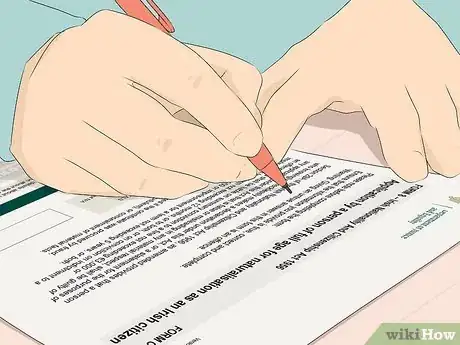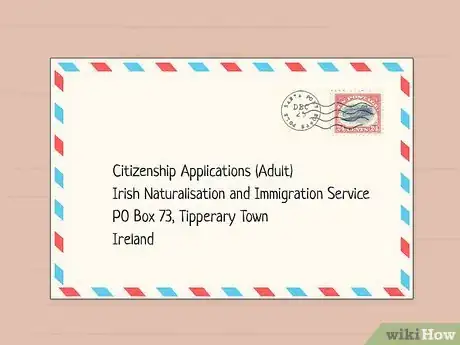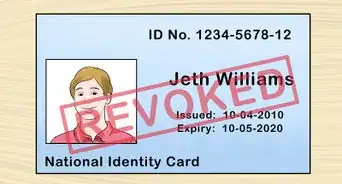This article was co-authored by wikiHow Staff. Our trained team of editors and researchers validate articles for accuracy and comprehensiveness. wikiHow's Content Management Team carefully monitors the work from our editorial staff to ensure that each article is backed by trusted research and meets our high quality standards.
This article has been viewed 26,055 times.
Learn more...
If you’ve lived in Ireland for a few years and meet the eligibility requirements, you might be legally able to become an Irish citizen. Unless you’re of Irish descent, you’ll have to be naturalized as an Irish citizen to do this. Fortunately, the process of becoming an Irish citizen is as easy as submitting an application and attending a citizenship ceremony.
Steps
Meeting the Eligibility Requirements
-
1Be 18 years old or older at the time of your application to be of full age. This means that you can submit a naturalization application on your own behalf. Anyone younger than 18 is legally considered a minor and must have an application submitted on their behalf by a parent or legal guardian.
- For a minor to be eligible for Irish citizenship, they must meet 1 of 3 conditions: have at least 1 parent be an Irish citizen; be of Irish descent; or be born in Ireland after January 1, 2005, and have lived in Ireland for at least 5 years.
- The nature of Irish descent is pretty complicated for legal purposes and revolves around whether your parents or grandparents were Irish citizens born in Ireland. For a clearer explanation of the laws surrounding Irish descent, visit this website: https://www.citizensinformation.ie/en/moving_country/irish_citizenship/irish_citizenship_through_birth_or_descent.html.
-
2Be a legal resident of Ireland for at least 5 of the last 9 years. This must include at least 1 year of continuous residence in Ireland immediately prior to the date of your application. Note that if you’re married to an Irish citizen, you’re only required to have lived in Ireland for 3 of the last 5 years.[1]
- You must be able to provide documentation that proves you were legally resident in Ireland during this period. This can include, among other things, housing documents, bank statements, or a letter from your employer.
- Other than the 1 year of residence immediately prior to your application date, the other 4 years of required residence do not have to be continuous. So long as you have legally lived in Ireland for 1460 days during the previous 9 years, you will meet the residency requirement.
Tip: Note that if any of the years of your residency in Ireland were leap years, you must add 1 day to the 1460-day residency requirement for each leap year.
Advertisement -
3Avoid having a criminal record to be considered of good character. Being “of good character” is one of the more ambiguous requirements for Irish citizenship, but it basically means that you be able to pass a police background check. The best way to do this is to simply avoid having a police record to begin with.[2]
- If you do have a criminal record or any ongoing proceedings in the justice system, be sure to disclose these on your application forms.
-
4Note that you may be entitled to citizenship if you’re of Irish descent. If you were born outside of Ireland and your parents are Irish citizens who were also born outside of Ireland, then you’re entitled to become an Irish citizen. This means that you can become a citizen simply by registering your birth in the Foreign Births Register.[3]
- If you were born outside of Ireland but your parents were born in Ireland, then you are automatically an Irish citizen regardless of where you were born.
- Note that your Irish citizenship is effective as of the date of your registration in the Foreign Births Register, not the date of your actual birth.
Submitting Your Application
-
1Download and fill out the right form for your circumstances. There are several different naturalization application forms that the Irish government uses, with each one applying to different situations. Visit the website for the Irish Naturalisation and Immigration Service (INIS) to download and print the right form for you. Then, fill in your information, but refrain from actually signing the application until you can take it to an authorized witness.
- The titles for each form will specify which type of applicant should use them. For example, Form 8 is entitled “Application for a person of full age,” whereas Form 9 is entitled “Application for a minor.” Each form on the INIS website is also followed by a brief description of who should use it.
- The URL for the INIS website is: http://www.inis.gov.ie/en/INIS/Pages/citizenship-naturalisation-forms.
-
2Gather up any related forms you will also need to provide. This will include documentation that proves your identity and nationality (such as a passport), as well as whatever forms are specifically called for on your particular application form. Most forms will require you to present your birth certificate, proofs of residence for each year of residence claimed, and copies of bank statements from 3 of the last 6 months.
- Note that you must provide the original of your passport, not just a photocopy.
- Proofs of residence must be documents that contain your name and address and a date of issue. These can include a mortgage or rent agreement, household bills, or bank statements.
- If you’re married to an Irish citizen, you must present evidence of your marriage (such as a marriage certificate).
Tip: Note that if any of your documents are not in English or Irish, they must be translated by a professional translator and you must present both the original and translated versions along with your application.
-
3Take your form to be signed in the presence of an official witness. Your application form will state who counts as an authorized witness, although this typically is a solicitor, commissioner for oaths, or a notary public. You must sign your application form in the presence of this witness, who must also sign and date your application.
- Bring all of your supporting documentation to this witness, since they may be required to sign some of these as well.
-
4Be sure to include a €175 application fee with your forms. There is no exception to this application fee and it cannot be waived. Note that this payment may only be made in the form of a bank draft; the INIS cannot accept checks or cash.
- The bank draft must be drawn on an Irish bank and be made payable to Secretary General, Department of Justice and Equality.
-
5Mail in your completed application and await your decision. It generally takes about 6 months for straightforward applications to be processed. Mail your application materials to this address: Citizenship Applications (Adult), Irish Naturalisation and Immigration Service, PO Box 73, Tipperary Town, Ireland.[4]
- The INIS will mail your decision to you in the form of a letter.
Completing the Citizenship Process
-
1Respond to any requests for additional or missing documents. If your application is missing an important document or requires any additional forms, the INIS will contact you. Make sure you provide these extra or missing documents within 28 days in order for your application to remain valid.
-
2Submit your final documentation and certification fee. If your application has been approved, you will receive an approval letter that will ask you to submit passport-sized photos for your Certificate of Naturalisation. Your certification fee will be based on your particular status as an applicant.
- Adult applicants have to pay a €950 fee, while the certification fee for a child applicant is €200. Applicants who are widows or widowers of Irish citizens also have to pay €200 instead of €950.
- Those who applied as refugees or stateless persons do not have to pay a certification fee.
-
3Attend a citizenship ceremony to make your declaration of fidelity. You will receive an invitation to a Citizenship Ceremony, held periodically throughout the year, about 4-5 weeks before the ceremony takes place. At the ceremony, you will make a declaration of fidelity to the nation and receive your Certification of Naturalisation.
- Note that child applicants do not have to attend this type of ceremony. Their Certification of Naturalization is mailed out in the post.
Tip: Once you’ve completed this process, you will be eligible to apply for an Irish passport. You don’t need to have a passport in order to be an Irish citizen, but a passport is good evidence to have of your new citizenship.
References
- ↑ https://www.citizensinformation.ie/en/moving_country/irish_citizenship/becoming_an_irish_citizen_through_naturalisation.html
- ↑ https://www.citizensinformation.ie/en/moving_country/irish_citizenship/becoming_an_irish_citizen_through_naturalisation.html
- ↑ https://www.citizensinformation.ie/en/moving_country/irish_citizenship/irish_citizenship_through_birth_or_descent.html
- ↑ http://www.inis.gov.ie/en/INIS/Pages/citizenship-naturalisation-forms







































































